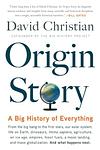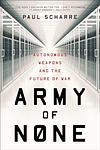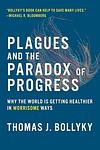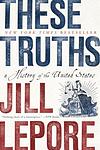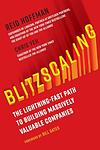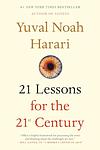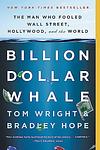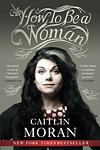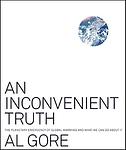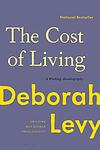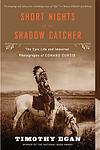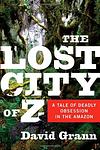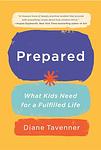The Greatest "Nonfiction" Books Since 2000
Click to learn how this list is calculated.
This list represents a comprehensive and trusted collection of the greatest books. Developed through a specialized algorithm, it brings together 286 'best of' book lists to form a definitive guide to the world's most acclaimed books. For those interested in how these books are chosen, additional details can be found on the rankings page.
Genres
Countries
Date Range
Reading Statistics
Click the button below to see how many of these books you've read!
Download
If you're interested in downloading this list as a CSV file for use in a spreadsheet application, you can easily do so by clicking the button below. Please note that to ensure a manageable file size and faster download, the CSV will include details for only the first 500 books.
Download-
576. Origin Story by David Christian
This book offers a comprehensive overview of the universe's 13.8 billion-year history, from the Big Bang to the present day, in a manner that is accessible to non-scientists. It explores the development of the cosmos, the emergence of life on Earth, and the evolution of humanity, weaving together insights from a range of disciplines including cosmology, biology, and anthropology. The narrative is structured around the concept of "Big History," aiming to provide readers with a deeper understanding of humanity's place within the vast, complex system of the universe. Through this lens, the book addresses fundamental questions about our origins, the intricate interconnections that sustain life, and the future challenges we face on a planetary scale.
-
577. The Future Of Capitalism by Paul Collier
In "The Future of Capitalism," the author delves into the current challenges facing capitalist societies, including deepening economic divides, geographical disparities, and the erosion of ethical norms that have traditionally guided market economies. The book argues for a reinvention of capitalism, advocating for a model that emphasizes social solidarity, a sense of obligation to the community, and policies that address the needs of the most vulnerable. Through a blend of personal experience, economic analysis, and policy recommendations, the author makes a compelling case for a more ethical and inclusive form of capitalism that can address the 21st century's complex social and economic issues.
-
578. Army Of None by Paul Scharre
This book delves into the rapidly evolving world of autonomous weapons and the future of warfare, where machines are increasingly taking over decisions once made by humans. It explores the complex ethical, legal, and strategic challenges posed by unmanned systems on the battlefield, from drones to AI-driven robots. The author, a veteran and expert in defense policy, navigates through the technological advancements, potential benefits, and alarming risks associated with these weapons. He raises critical questions about accountability, the morality of machine decision-making in life-and-death situations, and the potential for new types of conflict, urging for a thoughtful approach to the development and deployment of autonomous weapons systems.
-
579. Plagues And The Paradox Of Progress by Thomas J. Bollyky
This book explores the complex relationship between global health improvements and the economic and political challenges that arise as a result. It delves into how the reduction of infectious diseases has led to a longer lifespan and unprecedented population growth, but also highlights the paradox where such progress brings about new health threats and economic disparities. The narrative underscores the importance of integrating health policies with economic and social development to address these emerging challenges, advocating for a holistic approach to ensure sustainable progress. Through a blend of historical analysis, case studies, and current trends, the text presents a compelling argument for rethinking global health strategies in the face of evolving global health landscapes.
-
580. These Truths by Jill Lepore
This book offers a sweeping exploration of the history of the United States, from its earliest days to the present, through the lens of the ideals set forth in the Declaration of Independence: life, liberty, and the pursuit of happiness. The narrative delves into the contradictions between these founding principles and the realities of American history, including issues of racism, inequality, and political division. By examining the stories of both well-known and obscure individuals, the book presents a comprehensive and critical examination of the American experiment in democracy, its achievements, its failures, and its ongoing challenges. Through meticulous research and engaging storytelling, it invites readers to reflect on the nation's past and consider the path forward.
-
581. Leadership by Doris Kearns Goodwin
This book delves into the lives and leadership styles of four U.S. Presidents, exploring how their distinct backgrounds, personalities, and experiences shaped their approach to the challenges of their time. Through meticulous research and engaging storytelling, the author reveals how each president faced adversity, made critical decisions, and demonstrated resilience and moral leadership. By drawing parallels and contrasts among these leaders, the book offers insightful lessons on leadership that apply beyond the political arena, emphasizing the importance of empathy, humility, and perseverance. Through these historical narratives, the book provides a profound understanding of what it takes to lead effectively in times of crisis and change.
-
582. Nine Pints by Rose George
This book offers an in-depth exploration of blood, a substance that is both a vital component of our physiology and a symbol of life, death, and disease throughout human history. The narrative takes readers on a global journey, delving into the science, culture, and commerce of blood, from the history of bloodletting to the contemporary controversies surrounding blood donation and the blood trade. Through engaging storytelling, the author reveals the complexities of blood as a biological entity and its broader significance in society, touching on topics such as menstruation, bloodborne diseases, and the life-saving role of blood transfusions, while also examining the ethical implications of blood banking and the global inequalities in blood supply and access.
-
583. The Book Of Why by Judea Pearl, Dana Mackenzie
This book explores the science of cause and effect, offering a groundbreaking perspective on how humans can understand and manipulate the world around them. By introducing a new mathematical framework known as causal inference, the authors demonstrate how we can move beyond traditional statistical analysis to answer complex questions about cause and effect. Through engaging examples and accessible explanations, the book challenges readers to think critically about the data and correlations they encounter in daily life, ultimately empowering them with the tools to ask and answer the fundamental question of "why?" in a more rigorous and informed manner.
-
584. Blitzscaling by Reid Hoffman
This book explores the aggressive growth strategy known as "blitzscaling," which prioritizes speed over efficiency in an environment of uncertainty. It outlines how companies can scale at a dizzying pace to become market leaders, leveraging network effects and capitalizing on rapid technological changes. The strategy involves making calculated decisions that can often seem counterintuitive, such as focusing on rapid expansion over immediate profitability or perfecting the product. Through a series of case studies and insights from successful entrepreneurs, the book provides a roadmap for startups and established companies alike to dominate their markets by embracing risk, prioritizing speed, and continuously adapting to the evolving business landscape.
-
585. Identity by Francis Fukuyama
In "Identity," the author delves into the complex and increasingly relevant issue of how the demand for recognition of one's identity has become a pivotal force in global politics. The book explores the concept of identity politics, tracing its origins from the philosophical ideas of the Enlightenment to its contemporary manifestations, which are often marked by divisive and polarizing debates. The author argues that the modern world's emphasis on individual rights and the recognition of diverse identities can both enrich societies and lead to conflicts. Through a detailed examination of historical and current events, the book offers insights into how identity politics impacts democracy and global stability, suggesting ways to acknowledge diverse identities while fostering unity and cooperation.
-
586. 21 Lessons For The 21st Century by Yuval Noah Harari
This book navigates through the complexities and challenges of the 21st century, offering insightful analysis and thought-provoking lessons on various pressing issues such as technology, politics, religion, and education. The author delves into the impact of artificial intelligence and biotechnology, exploring how they are reshaping the world and questioning the future of humanity in this rapidly changing landscape. Through a series of compelling essays, the book encourages readers to reflect on the values, meaning, and personal engagement in a world full of noise and uncertainty, aiming to equip society with the understanding and wisdom to navigate the unknown future.
-
587. Bad Blood by John Carreyrou
This book delves into the riveting true story of a Silicon Valley startup that promised to revolutionize the medical industry with a groundbreaking device that could perform a full range of laboratory tests using just a few drops of blood. However, the company's charismatic founder's ambition and the immense pressure to succeed led to one of the most notorious cases of corporate fraud in recent history. Through extensive reporting and interviews, the narrative exposes how the company's misleading claims, toxic workplace culture, and unethical business practices put patients at risk, eventually leading to its dramatic downfall. The investigation into the company's practices not only captivated the nation but also raised critical questions about innovation, integrity, and regulation in the tech industry.
-
588. Billion Dollar Whale by Tom Wright, Bradley Hope
This book delves into the astonishing true story of one of the most audacious financial schemes in history, orchestrated by Jho Low, a financier who managed to siphon off billions of dollars from the Malaysian sovereign wealth fund, 1MDB. With a combination of charm, bold deception, and the complicity of high-profile individuals and institutions, Low financed an extravagant lifestyle and bankrolled Hollywood films, all while eluding global law enforcement. This gripping narrative exposes the intricate web of fraud, money laundering, and corruption, stretching across multiple countries and involving a cast of characters from the upper echelons of political and financial power, revealing the vulnerabilities and dark corners of the global financial system.
-
589. The Perfect Weapon by David E. Sanger
This book delves into the complex and shadowy realm of cyber warfare, revealing how it has become the weapon of choice for the world's powers. Through meticulous research and interviews, it uncovers the strategies behind the United States' use of cyber capabilities for espionage and sabotage, and how these tactics are now being turned against it by adversaries. The narrative explores significant cyber incidents and their implications on national security, international relations, and the future of warfare. By highlighting the challenges of defending against invisible threats in a digital age, the book underscores the urgent need for new rules of engagement in cyberspace to prevent escalating cyber conflicts.
-
590. Presidents Of War by Michael Beschloss
This book provides a comprehensive examination of American presidents who have led the nation through times of war, from the early 19th century to the modern era. It delves into the complexities of presidential power, exploring how these leaders managed the immense responsibilities of wartime command, navigated the politics of war, and made decisions that shaped the course of American history. Through meticulous research and compelling narrative, the author reveals the personal and political challenges faced by these presidents, the impact of their decisions on the battlefield and home front, and the ethical and constitutional dilemmas posed by the expansion of executive power during times of conflict.
-
591. April 1865 by Jay Winik
"April 1865: The Month That Saved America" is a historical narrative that delves into the pivotal final month of the American Civil War, emphasizing how critical decisions and events in April 1865 helped to prevent the nation from fracturing permanently. The book explores key moments such as Robert E. Lee's surrender at Appomattox, Abraham Lincoln's assassination, and the lesser-known events that followed, which collectively helped to heal and reunite the country. Through detailed accounts and engaging storytelling, the author illustrates how the actions of a few individuals in the face of national crisis shaped the future of the United States, highlighting the delicate balance between war and peace, and the resilience of the American spirit.
-
592. How To Be A Woman by Caitlin Moran
The book is a humorous yet insightful memoir and feminist manifesto that combines personal anecdotes with broader socio-political commentary. The author navigates through various stages of womanhood, from adolescence to middle age, tackling subjects such as body image, workplace inequality, love, and motherhood. By sharing her own experiences and challenges, she invites readers to consider the complexities of being a woman in the modern world, advocating for a more inclusive and liberated approach to feminism that encourages women to embrace their identities and fight for equality.
-
593. Catherine The Great: Portrait Of A Woman by Robert K. Massie
This biography provides an in-depth look at the life of the longest-reigning female leader of Russia, tracing her journey from a minor German princess to the powerful Empress of Russia. It delves into her political achievements, her efforts to modernize Russia, and her numerous romantic liaisons, all set against the backdrop of the opulence and intrigue of the 18th-century Russian court. The book paints a vivid portrait of a complex woman who wielded her intelligence and charisma to navigate the treacherous waters of court politics, expand her empire, and become one of the most influential figures in European history.
-
594. An Inconvenient Truth: The Planetary Emergency of Global Warming and What We Can Do About It by Al Gore
This book is a comprehensive guide to understanding the global climate crisis and the steps that can be taken to combat it. The author, a former Vice President and environmental activist, presents scientific evidence of global warming, its causes, and its potential effects, including rising temperatures, melting ice caps, and extreme weather events. The book also provides practical solutions to the problem, such as reducing carbon emissions, increasing renewable energy use, and promoting sustainable practices. The author's aim is to educate readers about the urgency of the issue and inspire them to take action.
-
595. Alex Ferguson: My Autobiography by Sir Alex Ferguson
The book is a candid memoir by one of the most successful and respected managers in football history, chronicling his career and life at the helm of one of the world's most famous football clubs. The author reflects on his managerial philosophy, the art of leadership, the highs and lows of his tenure, and his relationships with some of the biggest names in the sport. He shares insights into his personal life, his unwavering commitment to the club, and the strategies that led to numerous domestic and international trophies. This autobiography is not just a chronicle of a storied career, but also a blueprint of what it takes to be at the top in the highly competitive world of professional football.
-
596. The Cost of Living by Deborah Levy
"The Cost of Living" is a memoir that explores the author's journey through womanhood, motherhood, and writing. After her marriage dissolves, the author moves to a dreary apartment with her two daughters, facing the challenges of single parenthood while trying to maintain her career as a writer. The book is a reflection on societal expectations of women, the sacrifices made, and the price paid for freedom and independence. It's a thoughtful meditation on feminism, the complexities of love, and the pursuit of a creative life.
-
597. Rough Crossings by Simon Schama
"Rough Crossings" is a historical account of the experience of African American slaves during the American Revolution. It focuses on the British promise to grant freedom to slaves who joined their cause, and the subsequent journey of these former slaves to Nova Scotia and Sierra Leone. The book explores the complexities of this period in history, questioning the traditional narrative of the American Revolution and shedding light on the struggle for freedom and equality by African Americans.
-
598. Short Nights Of The Shadow Catcher: The Epic Life And Immortal Photographs Of Edward Curtis by Timothy Egan
The book chronicles the remarkable journey of an intrepid photographer who dedicated his life to documenting the lives and cultures of Native American tribes at the turn of the 20th century. With a passion that bordered on obsession, he traversed the American West, capturing thousands of images and recordings that aimed to preserve the fading heritage of indigenous peoples. His monumental project was both a groundbreaking anthropological achievement and a testament to the power of photography as a means of cultural preservation. Despite facing personal and financial hardships, his work culminated in an invaluable historical record that continues to influence our understanding of Native American history and culture.
-
599. The Lost City of Z by David Grann
This gripping non-fiction book follows the story of a British explorer who, in 1925, ventured into the Amazon jungle in search of a fabled civilization known as Z. The explorer and his party vanished without a trace, sparking numerous attempts to find them and the lost city. Nearly a century later, the author himself journeys into the Amazon, uncovering fresh evidence and revealing the shocking truth about what really happened to the lost expedition. The book combines history, biography, and old-fashioned adventure to create a captivating tale of exploration and obsession.
-
600. Prepared by Diane Tavenner
This book offers a transformative approach to education, focusing on preparing students for the real world rather than just academic success. The author, drawing from her extensive experience in education, outlines a model that emphasizes life skills, critical thinking, and emotional intelligence alongside traditional learning. Through personal anecdotes, research, and practical advice, the book advocates for a system that equips students to handle the challenges of adulthood, pursue their passions, and achieve personal and professional fulfillment. It serves as a guide for parents, educators, and policymakers on how to support children in becoming independent, capable, and compassionate individuals.
Reading Statistics
Click the button below to see how many of these books you've read!
Download
If you're interested in downloading this list as a CSV file for use in a spreadsheet application, you can easily do so by clicking the button below. Please note that to ensure a manageable file size and faster download, the CSV will include details for only the first 500 books.
Download